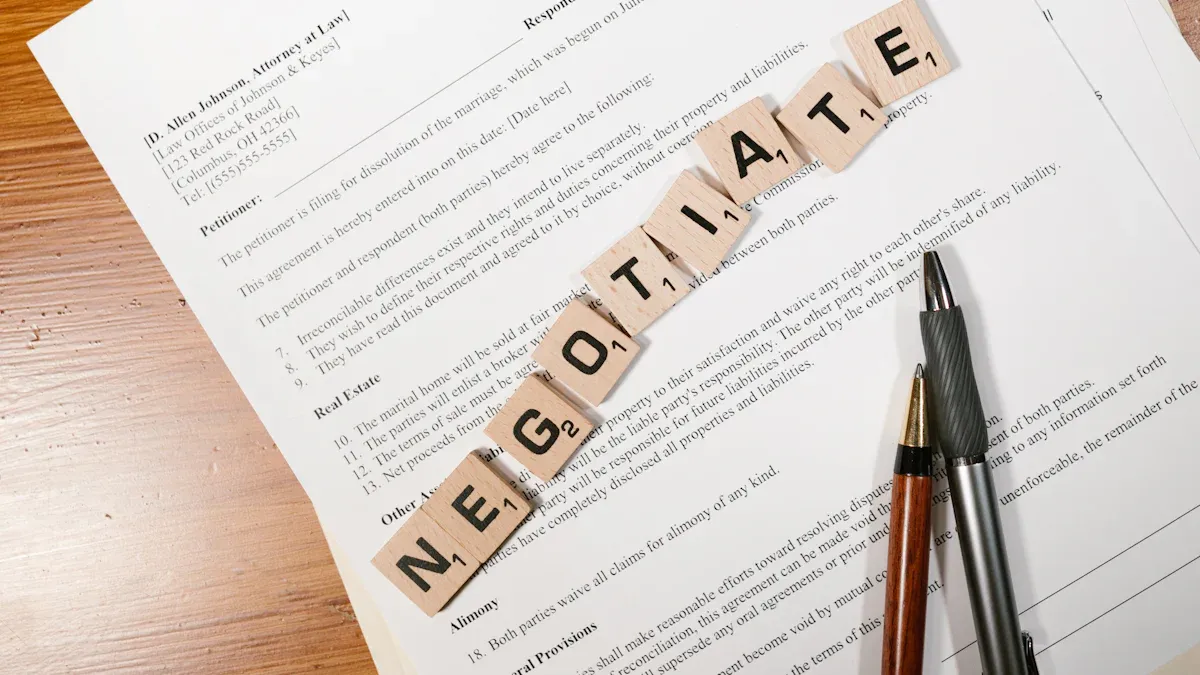What to Consider Before Hiring a Lawyer for Divorce in Texas

You do not always need a lawyer to get a divorce in Texas. Many people handle an uncontested divorce Texas process by themselves. In 2024, about 65% of divorces in Texas were uncontested. This means most couples agreed on the terms and finished the divorce Texas process without much fighting. Uncontested divorce Texas cases are more common now because filing is easier and rules are clearer. If your case is simple, you may not need expert help. But if you have disagreements or complex issues, professional advice can help protect your rights during a divorce Texas proceeding.
Uncontested Divorce in Texas
If you and your spouse agree on everything, you can get an uncontested divorce in Texas. This kind of divorce is good if you both want to stay out of court and solve things calmly. You can use this choice if you both agree about property, child custody, support, and other big things. Many people think uncontested divorce is faster and easier than a contested one.
File for Divorce Without a Lawyer
You can file for divorce without a lawyer in Texas if your case is simple and uncontested. This means you and your spouse agree on all the important things, like property and children. People who do this are called "pro se" filers. Texas courts let you handle your own case, but you must follow the rules and fill out the right forms.
Tip: Filing for divorce without a lawyer saves money, but you need to be careful. If you make mistakes, your divorce could take longer or cause problems later.
Here are the main steps to file for divorce without a lawyer in Texas:
Make sure you meet Texas residency rules. You or your spouse must have lived in Texas for at least six months and in your county for at least 90 days.
File the Original Petition for Divorce at the courthouse. Include all the forms you need, especially if you have kids or property.
Give your spouse a copy of the petition. Your spouse can sign a waiver of service or file an answer.
Fill out the Final Decree of Divorce form. Both of you must agree and sign it.
Wait 60 days. Texas law says you must wait before your divorce is final.
Go to court for a short hearing. The judge will look at your agreement.
File the signed Final Decree with the court clerk. This finishes the divorce process.
Many people use eFileTexas.gov to file for divorce online. This website lets you fill out and send forms on the computer. You can also find self-help tools and guides for the uncontested divorce in Texas process. If you do not have kids or property, the online system is even easier.
How to Get an Uncontested Divorce in Texas
To start the uncontested divorce process, you must meet some rules. The table below shows the main steps and what you need to do:
Requirement/Step | Description |
|---|---|
Residency | You or your spouse must have lived in Texas for at least 6 months and in the county for 90 days. |
Grounds for Divorce | Both must agree on the reason, usually "insupportability" (no-fault). |
Agreement on Terms | You must agree on property, debts, child custody, support, and spousal maintenance. |
Forms and Filing | Complete all required forms and file them with the court. Pay the filing fee. |
Service of Process | Serve your spouse with papers or get a waiver of service. |
Waiting Period | Wait 60 days after filing before the divorce can be finalized. |
Finalization | Both sign the divorce decree. A judge reviews and approves it. |
You can use eFileTexas.gov to fill out and send your forms online. The site has a self-help section with interviews that help you fill out the right documents for an uncontested divorce in Texas. You can pick "family cases" to find the correct forms. After you file, you will set a final hearing date. You may need to give affidavits or other forms, especially if you have kids.
Note: Even if your divorce is uncontested, legal advice can still help. A lawyer can check your agreement to make sure it protects your rights and follows Texas law. This is important if you have property, retirement accounts, or kids. Legal advice helps you avoid mistakes, like unclear agreements or missing money details, which can cause problems later.
Common Mistakes When Filing Without an Attorney
Filing for an uncontested divorce in Texas without a lawyer can work well, but you need to avoid common mistakes. Here are some problems people have:
Waiting too long or ignoring the divorce process, which can make things harder.
Making quick choices without thinking about the future.
Letting feelings control your decisions.
Not getting financial papers early.
Trusting your spouse for all the money information.
Not keeping records of important things.
Explanation | |
|---|---|
Misunderstanding community property | You may not split things fairly if you do not know Texas laws. |
Errors in paperwork and filing | Mistakes can slow down your divorce or hurt your case. |
Making unnecessary concessions | You might agree to unfair terms without legal help. |
One spouse hiring a lawyer | This can give one person an unfair advantage in talks. |
If you want to know how to get an uncontested divorce in Texas, remember to check all your forms, know your rights, and think about legal advice if you are unsure. The uncontested divorce in Texas process can go smoothly if you get ready and follow each step.
When to Hire a Lawyer for Divorce Texas
Deciding when to get a lawyer for divorce Texas is important. Not every divorce needs a lawyer, but some do. Sometimes, you need expert help to protect your rights and future.
Contested Texas Divorce
A contested divorce means you and your spouse do not agree. You might fight about property, child custody, or support. These cases are harder and more stressful. You may have to go to court and show proof. Each person usually gets a family law attorney for help.
Here are signs your divorce is contested and you need a divorce attorney:
You and your spouse cannot agree on splitting property or debts.
You argue about child custody or support.
The divorce needs court hearings, mediation, or a trial.
The case has tricky money records or business interests.
Note: Contested divorces take longer and cost more. The court often gets involved. A judge will decide if you and your spouse cannot agree. A family law attorney helps you at every step and helps you avoid mistakes.
Children or Property Involved
Divorces with children or lots of property need extra care. Texas courts want what is best for the child. Custody choices decide where your child lives and who makes choices for them. If you and your spouse do not agree, a family law attorney can help you protect your child.
Property division in Texas can be hard. Texas uses community property laws, but the split is not always even. You must find, value, and split things like homes, retirement accounts, and debts. Sometimes, you need experts for business or tricky assets. A divorce attorney helps you find hidden assets and avoid unfair deals.
Some legal problems with children or property are:
Fights over legal and physical custody.
Hard property tracing, like mixed or inherited assets.
Needing special legal orders, like a Qualified Domestic Relations Order (QDRO) for retirement accounts.
Making sure child support and parenting plans follow the law.
A family law attorney explains your rights and duties. They help you avoid mistakes that could hurt your money or your time with your kids.
Spouse Has a Lawyer
If your spouse hires a divorce attorney, you should get your own family law attorney fast. Going through divorce alone is risky. Your spouse’s lawyer knows the law and can use it for their side. You might not know your rights or the legal steps. This can lead to unfair deals or paperwork mistakes.
Here are risks if your spouse has a lawyer and you do not:
You might make costly mistakes with property or child custody.
You may not know what you can get under Texas family law.
Handling court forms and deadlines alone is hard.
Facing your spouse’s attorney in court or talks is scary.
You may not get advice to protect your interests.
Tip: Each person should have their own family law attorney. This avoids conflicts and makes sure both sides are treated fairly. A divorce attorney can help you get better deals and lower stress during divorce.
Other Times to Hire a Divorce Attorney
You should also get an attorney if:
There is a history of domestic violence or abuse.
You feel too upset to make good choices.
The divorce takes too long because of paperwork or talks.
You need a protective order to stay safe.
A family law attorney helps keep you safe, meets all legal rules, and protects your future. Finding an attorney early gives you the best chance for a fair result.
Remember: The right legal help can make a hard time easier. A family law attorney knows the Texas divorce process and can help you at every step.
Risks of No Lawyer in Texas Divorce

Legal Mistakes
When you handle your own divorce, you risk making legal mistakes. Texas divorce law has strict rules. Judges do not give you extra help if you make errors. Some common mistakes include:
Not sharing all financial information. This can lead to unfair asset division and even legal trouble.
Forgetting about tax issues with property or support. You might pay more taxes than you expect.
Not updating your will or trust. Your assets could go to the wrong person.
Ignoring child custody rules. This can hurt your relationship with your child.
Letting emotions guide your choices. You may agree to things that are not good for you.
Missing deadlines or filing the wrong forms. Your case could get delayed or dismissed.
If you do not follow the court’s orders, you could face fines, wage garnishment, or even jail time. Unpaid child support or alimony adds up with interest and penalties. The court can take money from your paycheck or bank account to collect what you owe.
Unfair Settlements
Without a lawyer, you may not get a fair deal. You might rush to finish the divorce and miss important details. Here are some risks:
You could accept less than your fair share of property.
You might not notice hidden assets or debts.
You may not understand the long-term costs of keeping a house or other assets.
You could agree to support payments that you cannot afford.
Settling too quickly can leave you with financial problems. If you do not check asset values, you may lose money. Ignoring mediation or other ways to solve problems can make your divorce more expensive.
Long-Term Consequences
The effects of legal mistakes can last for years. The table below shows some long-term risks:
Area | What Can Happen | Long-Term Impact |
|---|---|---|
Asset Division | Assets split unfairly or with tax problems | Financial loss, tax bills |
Child Custody and Support | Poor agreements or missed rules | Harm to parent-child bond, unfair support orders |
Filing Errors | Missed deadlines or wrong forms | Delays, extra costs, or case dismissal |
Enforcing Agreements | Informal deals not legally binding | More disputes and court visits later |
Lawyers help you avoid these problems. They know how to find hidden assets, check for tax issues, and make sure your agreements follow Texas law. Without legal help, you risk losing money, time, and even your rights as a parent.
Alternatives to a Lawyer for Texas Divorce

Mediation
Mediation lets you solve your divorce without court. A mediator is a neutral person who helps you and your spouse talk. You both get to make choices, not a judge. Mediation is usually faster and costs less than going to court. Many people finish mediation in one day or a few weeks. Court cases can take much longer.
Mediation keeps your business private and lowers stress. You can make deals that work for your family. Parents can learn to work together, which helps children.
Here is a table that shows how mediation and court are different:
Aspect | Mediation | Litigation |
|---|---|---|
Speed | Often finished in a day or weeks | Can take months or years |
Cost | More expensive | |
Control | You and your spouse decide | Judge decides |
Privacy | Private | Public |
Best for | People who can talk and compromise | High-conflict or complex cases |
You can also try collaboration or arbitration. In collaboration, each spouse has a family law attorney to help make an agreement. In arbitration, a neutral person listens and then decides.
Legal Aid and Free Help
If you cannot pay for a family law attorney, there are other ways to get help. Many groups in Texas give free or cheap help for divorce and family law. Legal Aid of Northwest Texas helps people with low incomes. They have clinics and answer questions about divorce. You can call them at 888-529-5277.
Other groups help with child support, custody, and safety. Here are some places you can contact:
Organization | Services Provided | Contact Information |
|---|---|---|
Tarrant County Domestic Relations Office (DRO) | Child support, legal support, family court services | 817-884-1742 |
Tarrant County Dispute Resolution | Mediation services | 817-884-2257 |
Texas A&M University Law Clinic | Free legal help for low-income people | 817-212-4123 |
Methodist Justice Ministry | Free help for victims of family violence | 817-339-2407 |
Mosaic Family Services | Legal help for victims of abuse and family law | 214-821-5393 |
SafeHaven of Tarrant County | Shelter, legal help, counseling for domestic violence victims | 877-701-7233 |
Texas Advocacy Project | Free legal help for survivors of violence | texasadvocacyproject.org |
If you feel unsafe or need help with violence, call these groups right away.
Self-Help Resources
You can find many tools if you want to do your divorce yourself. The Texas State Law Library gives you forms and guides. Texas Law Help and Texas Court Help have step-by-step guides and videos. These sites have forms for divorce, child support, and custody.
Texas State Law Library: Forms and guides for the law
Texas Law Help: Online help and chat for people without lawyers
Texas Court Help: Videos and info in English and Spanish
eFile Texas Self Help: Free website to fill out and send court forms
Pro Se Divorce Handbook: Guide for people without a lawyer
Texas Young Lawyers Association Pro Se Litigant Guide
These tools help you learn the steps and avoid mistakes. If you have trouble, you can ask a family law attorney for help with one problem.
You might not need a lawyer if your divorce is uncontested in Texas and you both agree on everything. But if your case is complicated, like if you have kids or property, getting legal help can protect your rights. Think about these things:
If you are not sure what to do, you can use free meetings or self-help tools for advice. Picking the best way for your uncontested divorce in Texas can help you feel sure about your next steps.
FAQ
What is the waiting period for divorce in Texas?
You must wait at least 60 days after you file for divorce. The court will not finalize your divorce before this time ends.
Can you get a divorce in Texas without going to court?
Yes, you can. If you and your spouse agree on everything, you may only need a short court hearing. Some counties allow you to finish paperwork without a full hearing.
Do you have to split everything 50/50 in a Texas divorce?
Texas uses community property rules. The court tries to split things fairly, but not always 50/50. You and your spouse can agree on a different split.
How much does it cost to file for divorce in Texas?
Most counties charge $250 to $350 to file for divorce. You may pay more for extra forms or services. Some people qualify for a fee waiver.
Can you change your name during a Texas divorce?
Yes, you can ask the court to change your name in your divorce paperwork. The judge will approve it if you request it before the divorce is final.
See Also
How To Choose The Top Divorce Lawyer In Texas
Steps To Begin Your Divorce Journey In Texas
Getting Ready For The Challenges Of Texas Divorce
Subscribe to get the updates!
Sign up now to receive timely blog updates.
I accept the email subscription terms.

